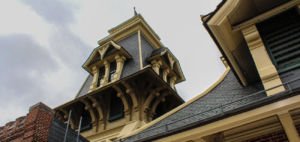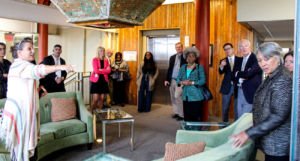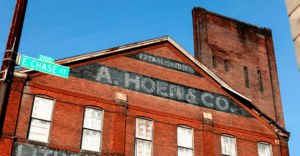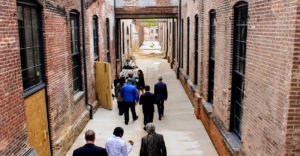A First-Hand Look at Project Impacts
As part of our fall board meeting, NTCIC’s board of directors recently visited several NTCIC projects, gaining a first-hand look at the full life cycle of the impact of these Historic Tax Credit (HTC) and New Markets Tax Credit (NMTC) investments. The group visited the offices of Humanim, a nonprofit social services organization, and the Hoen Lithograph buildings, which will become the future Center for Neighborhood Innovation. These NTCIC investments, different in their own regard, utilized historic preservation, NMTCs, and both state and federal HTCs to support and catalyze community and economic development efforts.

Humanim at the American Brewery Building
The group began their tour with the historic American Brewery building and the home of Humanim, hosted by Vice President of Advancement Diana Ellis and Cindy Plavier-Truitt, Chief Business Officer. Originally a small warehouse built in 1887 to house the rapidly expanding Weissner Brewing Company, the building changed hands during Prohibition, before its vacancy in the early 1970s. The building sat unused and decaying for over 30 years until Humanim saw hope and opportunity.
The nonprofit organization Humanim started as a vocational day program in Howard County, Maryland, in the early 1970s. Their initial launch into the area of social enterprise began in 1983 with iScan, a document management service that provides tech employment opportunities to community members with intellectual and developmental disabilities.

Today, Humanim operates five social enterprises; more than 40 programs in the areas of human and youth services, workforce development, and education; and supports over 4,500 participants annually. Their wraparound programming and suites of services target a variety of challenges faced by communities in need, particularly those with employment barriers such as former incarceration, by creating an ecosystem that supports both economic growth and social benefits for years to come.
This ecosystem includes Details Deconstruction, Brick + Board, City Seeds, and School of Food. These unique yet complementary enterprises attract program participants who enter with no educational background in culinary arts or construction/reclamation and exit with career-path employment and a variety of benefits. In the last five years, these enterprises have employed over 300 individuals, over half of which were formerly incarcerated.
The growth and expansion of Humanim’s services are due, in part, to their decision to revitalize the historic American Brewery building. The project closed on financing in 2007 utilizing both state and federal HTC equity supported by NTCIC, as well as NMTC allocation provided by both NTCIC and City First Bank of DC, with Bank of America as the investor. You can learn more about the project’s financing here.

Hoen Lithograph Buildings
Next, the group visited the Hoen Lithograph buildings, the future site of the Center for Neighborhood Innovation. This adaptive reuse project, which closed on NTCIC supported HTC and NMTC financing in 2018, is due to complete construction in 2020. The city-block-wide adaptive reuse project will restore and repurpose a former lithograph printing facility, vacant since the early 1980s, to co-locate and grow workforce development programs, educational training, neighborhood revitalization advocacy networks, and nonprofits committed to strengthening the local neighborhood.
As the team toured the East Baltimore campus, construction crew members were installing interior walls and preparing the courtyard for infill. Original wood beams, Baltimore bricks, and even the two-story-tall antique furnace door are in the process of being preserved, reused, and highlighted all around the buildings.

The site will be anchored by Strong City Baltimore, a nonprofit partner in the overall development effort, which will take space within the largest historic building in the complex. This organization provides a wealth of community-centric programming, such as literacy training and early childhood education, and sponsorships for over 100 local nonprofits.
Associated Builders and Contractors, a national construction industry trade association providing workforce training, will also serve as an anchor tenant. Founded in 1950, the company offers training to over 476,000 individuals annually and connects program participants with career-track positions in the industry. Their move to the Hoen Lithograph building represents a consolidation of their area apprenticeship programs, allowing them to create a more effective and streamlined pathway for community residents to enter the building trades.
Learn more about the project’s financing here.
An Ecosystem of Opportunities
These two projects will provide community members and program participants with the tools and knowledge to play a direct role in the revitalization of their neighborhoods.
As the group toured the East Baltimore neighborhood in which these two projects are located, signs of these revitalization efforts were visible. Humanim leaders described their hopes for additional restoration efforts to neighboring warehouse space surrounding the American Brewery building to house new and expanding services and entrepreneurial endeavors supported by Humanim’s programming. Just a couple blocks south, the site of a former pumping station is actively transforming into the Baltimore Food Hub, which is now home to Humanim’s enterprise City Seeds. The development team for the Hoen project noted that houses all around the block, stretching up to the American Brewery, were being restored by the owners, bringing a renewed sense of activity to these predominantly vacant blocks. With the influx of opportunities for community members provided by these nonprofits, they envision a new life for a historically underinvested neighborhood.
NTCIC is proud to have supported the HTC and NMTC financing for these endeavors, along with our other partners, including Bank of America, Telesis, City First Bank of DC, and US Bank; and to play a part in supporting the revitalization of communities in Baltimore and beyond.